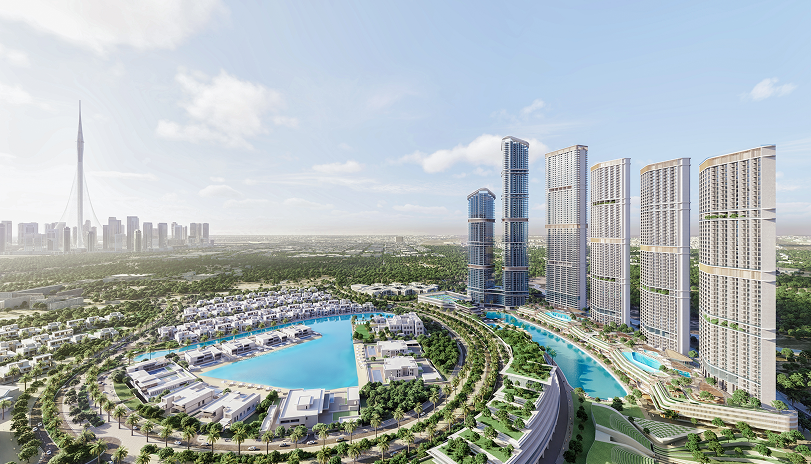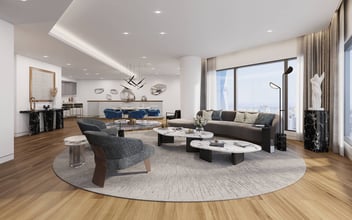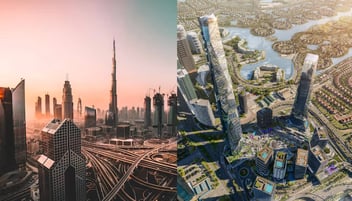Luxury real estate is no longer just about prime locations and high-end finishes—it’s about sustainability, efficiency, and long-term value. As global markets shift toward green-certified developments, the UAE is leading the charge with its Net Zero by 2050 strategy, reinforcing the demand for properties that offer both financial and environmental benefits.
From smart energy systems to LEED-certified developments, sustainable real estate is defining the next generation of urban living.
The Rise of Sustainable Real Estate in the UAE
Dubai's architectural landscape is rapidly transforming under the emirate's sustainability vision. The Dubai Clean Energy Strategy 2050 aims to source 75% of energy requirements from clean sources, revolutionising real estate development practices across the city. Developers now integrate sustainability not as an afterthought but as a core design principle.
The UAE's Net Zero by 2050 strategy has accelerated the demand for green-certified developments that deliver both environmental and financial benefits. This shift has positioned Dubai as a frontrunner in sustainable urban development, with Uptown Dubai emerging as an exemplary model of this new approach to construction and community planning.
WHAT MAKES REAL ESTATE TRULY SUSTAINABLE?
Sustainability in real estate is no longer a niche concept—it’s the new gold standard. Today’s most sought-after developments aren’t just defined by striking architecture or premium locations; they are designed to consume less, waste less, and operate more efficiently. From energy-smart buildings and water-saving innovations to eco-conscious materials and seamless green infrastructure, the most forward-thinking properties are built with longevity in mind.
Green Building Certifications: The Standard for Sustainable Developments
A crucial measure of a development’s sustainability lies in its certification—a mark of credibility in an increasingly eco-conscious market. Globally recognised standards such as LEED (Leadership in Energy and Environmental Design), BREEAM, and WELL assess buildings on key sustainability factors, including energy efficiency, carbon footprint, water management, and indoor environmental quality. Among them, LEED certification has become a benchmark for world-class developments, ensuring buildings are designed for responsible resource management and long-term resilience.
As cities evolve, some developments are not just keeping up with the sustainability movement—they’re leading it.
Related Articles:
Uptown Dubai: The Future of Sustainable Urban Living
Uptown Dubai is at the forefront of this evolution. Built to LEED standards, the district integrates energy-efficient infrastructure aligned with Dubai’s 2050 Clean Energy Strategy, significantly reducing operational costs.
The district’s commitment to sustainability isn’t a trend; it’s a blueprint for the future. From its LEED Gold-certified Uptown Tower, designed by Adrian Smith + Gordon Gill Architecture, to its walkable public spaces, every element has been carefully crafted to strike a balance between ambition and accountability, reflecting its commitment to sustainability and setting a benchmark for future developments in the district.
Uptown Dubai redefines what it means to build sustainably, combining cutting-edge efficiency with a commitment to reducing environmental impact at every level:
Cutting-edge energy efficiency, water conservation, and low-carbon materials are embedded throughout its design, ensuring Uptown Dubai is as sustainable as it is striking.
- 100% of irrigation water is sourced from condensate recovery and treated sewage effluent, cutting freshwater consumption.
- 75% of construction waste was diverted from landfills, ensuring a more responsible building process.
- 5% of parking spaces are designated for green vehicles, while 2% are reserved for electric cars, complete with on-site charging stations.
Uptown Dubai is more than just infrastructure; it’s about creating a city where people want to live not just for today, but for decades to come. Strategically located in new Dubai, Uptown Dubai blends luxury, innovation, and sustainability, creating a dynamic ecosystem for investors, residents, and businesses. The Atrium is beginning to take shape as a lively addition to Uptown Dubai, introducing new spaces for dining, design, and connection. Now home to Uptown Social and the newly opened SUR, it offers a welcoming atmosphere where community and culinary experiences come together. As sustainable real estate continues to outperform the market, Uptown Dubai represents a rare opportunity to invest in the future of urban living.
Uptown Dubai’s dedication to green infrastructure and smart mobility solutions ensures that this evolving destination aligns with Dubai’s broader sustainability goals, creating an urban ecosystem that is both innovative and enduring. Because in the future of luxury, green is gold.







